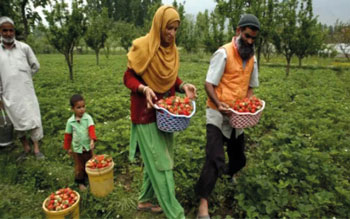Climate change has affected the quality and even quantity of the fruit crop in Indian illegally occupied Jammu and Kashmir, experts said.
Due to the heat wave, the farmers whose livelihood is dependent on horticulture are very much worried as they are unable to understand what to do at what time.
Experts believe that the effects of climate change, which is a long-term shift in patterns of temperature and weather, are likely to increase in the coming time and there is a need to take adaptability measures to lower the effect of climate change.
Dr Aamir Hussian Butt, a lecturer of Environmental Science at Government Degree College Hadipora in Baramulla told the news agency Kashmir News Observer that due to climate change the chances of damage to crops because of untimely snowfall, hailstorms, cloudbursts, and heavy rains have increased thereby affecting the crop.
He said Kashmir, being a mountainous area, is vulnerable and climate change had created instability as nothing follows any symmetrical pattern and we are witnessing everything going in a reverse manner here as we see weather of winter in summer and vice versa. He said people are themselves responsible for it as they have resorted to illegal mining, cutting down forests and other things which in turn has resulted in climate change which is affecting our crops and fruits.
Dr Tariq Rasool, Assistant Professor of Fruit Pathology at the University of Agricultural Sciences and Technology, Kashmir, told KNO that everything has both positive and negative impacts and the spring and summer seasons are vital for apple.
If spring will be wetter, chances of scabs remain high and the market of apples remains down and if spring remains dry, chances of scabs and other diseases remain less he said, adding that if the weather remains wet in summer, it leads to Alternaria, especially in low altitude areas which affects fruit quality while if it remains dry fruit quality gets disturbed but chances of diseases remain less but it increases insect population.
He said that drip irrigation facilities in dry weather conditions besides mulching can prove fruitful for growers.—KMS










